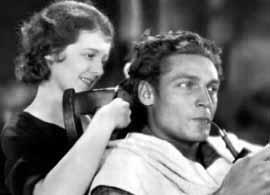
 |
| Photo © 1927 Fox Film Corporation |
| Academy Award Nominations and Winners: | |
| Best Picture | |
| ★ | Best Director: Frank Borzage |
| ★ | Best Actress: Janet Gaynor (also cited for Street Angel and Sunrise) |
| ★ | Best Writing (Adaptation): Benjamin Glazer |
| Best Art Direction: Harry Oliver | |
| Permalink | Home | Early Cinema | ABC | Blog |